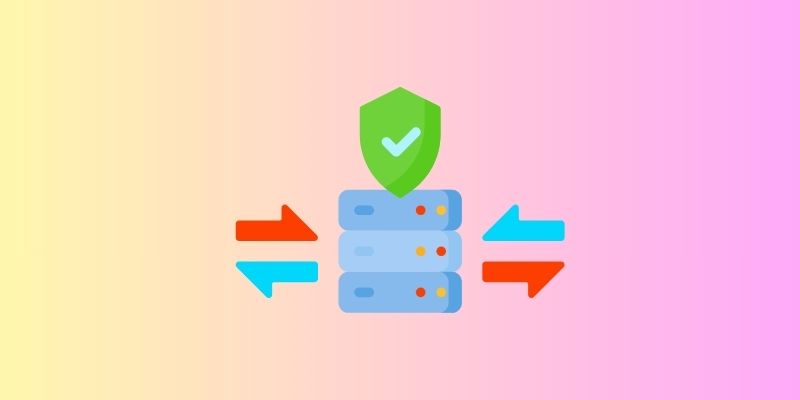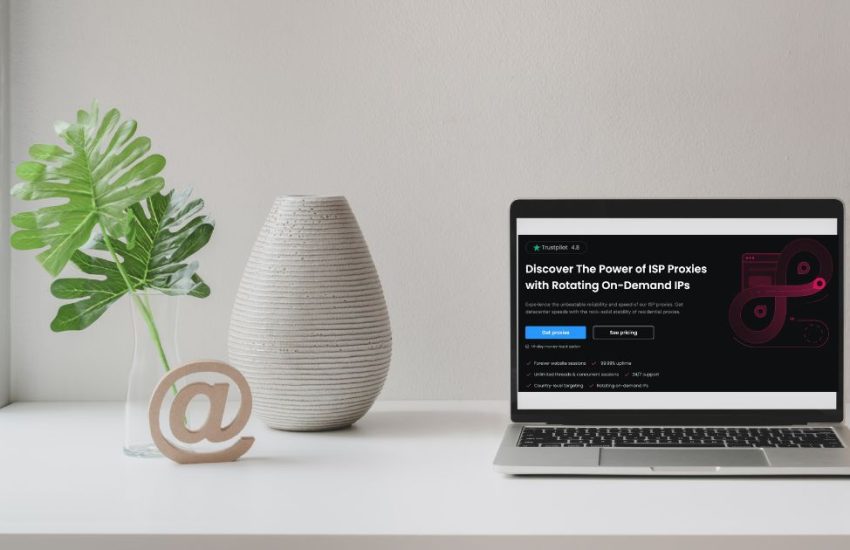Today’s digital world would be much more difficult to manage and less resourceful if it wasn’t for web scraping. It’s a common practice for collecting vast amounts of data, providing businesses with invaluable insights for growth.
To scrape public data successfully, among many things, it’s crucial to avoid IP bans, CAPTCHAs, and other restrictions set by information-rich websites. Here, proxies play a pivotal role.
In this article, we’ll explain how web scraping and proxies work in as simple terms as possible. We’ll also show you how to integrate proxies into your web scraping projects.
What is Web Scraping?
Web scraping is a method to gather public data from websites. It usually involves automatically fetching web pages using dedicated software to retrieve the entire HTML code or specific data points.
When retrieving the whole HTML code, you’re essentially downloading a web page’s full structure and content, which gets you a comprehensive view but sometimes with unnecessary details.
On the other hand, retrieving specific data points means downloading only the precise bits of information you need from the page, making the process more efficient and the output more focused.
Some websites offer official APIs (Application Programming Interfaces) that allow users to retrieve data points without dealing with the website’s HTML code. Instead of scraping the site’s front end, the user requests data directly from the API and receives structured data, which eliminates the need for additional data cleaning and processing.
However, lots of people turn to third-party universal scraping APIs over official website APIs for greater convenience and coverage. They provide a single interface for multiple websites, bypassing limitations and ensuring a consistent scraping experience across different platforms.
Many providers, like Smartproxy, offer scraping APIs for a simpler and more streamlined approach, as they are compatible with diverse websites. Such APIs can extract raw HTML and structured data for you from various targets, including search engine result pages, online marketplaces, social media platforms, discussion boards, real estate listing sites, job portals, and other websites and databases.
Web Scraping Benefits
As an automated process handling vast volumes of public data, web scraping is designed to make your life easier and better. It has the potential to drive transformative results for your business. There are endless use cases, but here are just some of the most common ones:
- Competitor analysis. Gather pricing information, customer reviews, and other essential data to make informed decisions, improve your eCommerce store, and create successful marketing campaigns.
- Market research and trend analysis. Collect valuable insights on market trends, consumer preferences, and industry developments. Make data-driven decisions and fuel your business growth by staying informed.
- Lead generation. Collect data from websites, directories, and social media platforms to generate leads for your sales and marketing efforts.
- Pricing strategies. Track competitors’ prices so you can adjust your pricing strategies in real-time to ensure competitiveness and maximize profit margins.
- Content and news monitoring. Scrape web data to gather and display news articles, blog posts, and other content from various sources to create fresh and relevant content for your news organization or blogging website.
- Data analysis. Gather stock market data, financial reports, economic indicators, and news related to the financial markets to make informed investment decisions and market analysis.
- Real estate market analysis. Collect data on property listings, pricing trends, location-specific data, and property characteristics to get some valuable insights into the real estate market.
The Role of Proxies in Web Scraping

We’ve mentioned the importance of proxies for effective web scraping. Why is that? Well, imagine there’s a bouncer at the entrance of a website you want to scrape, much like at the door of a nightclub. If you’re not complying with the appropriate dress code, you’re just not getting in. That’s about how your scraping project interacts with the defensive web systems.
Without proxies, those systems will recognize and halt any program attempting data collection. To efficiently gather public data, your scraping project needs to mimic a regular internet user, which is achievable through proxies.
Residential proxies offer several advantages over other proxy types. A residential proxy is an intermediary that provides the user with an IP address allocated by an Internet Service Provider (ISP). These proxies originate from household desktop or mobile devices, creating the illusion that the proxy user’s requests come from a legitimate internet user.
Since residential proxies are associated with real residential identities, they have a higher level of anonymity and are less likely to be blocked by websites. And maintaining a low profile when web scraping is essential. Residential proxies are excellent in helping you evade CAPTCHAs, rate limits, and other challenges because you can distribute requests across multiple IP addresses.
Here are the ways in which residential proxies contribute to effective public data collection:
- IP rotation. By rotating IP addresses from different geographic locations, you’ll have the best chance to avoid IP bans and proceed with your data collection.
- Anonymity. High anonymity is key when web scraping, as some websites may attempt to identify and block scraping bots or scripts. Residential proxies will hide your real IP address and identity well.
- Geo-location. With residential proxies, you can make your requests appear as if they come from various locations worldwide, which is useful for scraping geo-specific data or bypassing region-based restrictions on certain websites.
- Rate limiting and throttling. Some websites limit user requests within a given time frame. You can scrape data more efficiently by distributing your requests across multiple proxy IPs without hitting these limits.
- Scalability. Especially important when dealing with large or time-sensitive data scraping tasks, residential proxies will help scale your web scraping efforts by allowing you to make concurrent requests from multiple IP addresses.
If you’re seeking proxies, Smartproxy’s residential proxies are a great choice that meets the criteria mentioned above. With Smartproxy, you can either rotate your IP address with each request or maintain a sticky session lasting 1, 10, or 30 minutes.
They provide a huge pool of 55M+ residential IPs spanning 195+ locations, boasting a response time of fewer than 0.6 seconds, a 99.47% success rate, unlimited connections and threads, and a 99.99% uptime.
The Issue of Free Proxies
Free proxies may seem appealing, but they come with significant risks. Users can encounter security threats from unknown hosts, potentially injecting malware or stealing personal data. Performance is often subpar due to high traffic, resulting in slow speeds and frequent disconnections.
Unlike paid services, free proxies may lack true privacy, exposing IP addresses and even selling user data. There’s also an absence of dependable support, an influx of intrusive ads, and the constant threat of cyberattacks. Additionally, they often offer limited location options, possibly engage in unethical activities, and may not be compatible with many websites.
For optimal security, privacy, and reliability, we recommend going with a trustworthy proxy provider known for its ethical standards, positive customer feedback, and round-the-clock tech support. Take, for instance, Smartproxy, which lets you enjoy ethically sourced residential proxy IPs with the best entry point in the market, free tools, 24/7 support, in-depth documentation, and a 14-day money-back option.
Web Scraping With Proxies in 6 Steps
Now that we’ve understood the benefit of web scraping and what it takes to do it effectively, let’s go through the steps on how to scrape public web data using residential proxies.
Step 1: Choose a Residential Proxy Provider
Start by selecting a reputable residential proxy provider. One such option could be Smartproxy, where you can buy a monthly subscription or choose the usage-based Pay As You Go option.
Step 2: Obtain Residential Proxy Credentials
After buying a proxy plan, you’ll need to set up your authentication method to get the full proxy credentials, including your username, password, and the proxy endpoint, which you’ll incorporate into your web scraping code to access the proxy network.
Step 3: Set up a Scraping Environment
Choose an IDE (integrated development environment) for your scraping project and a programming language. Let’s use PyCharm (which offers a free trial) and the Python language that is commonly used for web scraping.
Step 4: Install and Import Request Libraries
You may need to install proxy management libraries to handle rotation and make HTTP/HTTPS requests. Libraries like Requests and Selenium allow you to configure such proxy settings. You might also be interested in a library called Scrapy, which is designed for web scraping. To install requests, Selenium, or other libraries on PyCharm, follow these steps:
- Create a new project in PyCharm.
- Navigate to Preferences or Settings.
- Expand the menu on the left side panel of Project: [your_project_name] and select Python Interpreter.
- Here, you’ll find the installed packages and their version number. To install new ones, click the + or Add button.
- In the search bar, type “requests” or any other package you want to install.
- Select the desired package and click Install Package at the bottom.
Now, requests and any other package you’ve installed will be available for use in your project.
Step 5: Set Up Your Web Scraping Code
Next, it’s time to integrate your proxies into your scraping code. See the example below that uses the requests library to gather public web data:
import requests
proxy_url = "http://username:password@endpoint:port"
proxies = {
"http": proxy_url,
"https": proxy_url
}
response = requests.get("https://example.com", proxies=proxies)
print(response.content)Replace the placeholder “http://username:password@endpoint:port” with your actual proxy credentials’ username, password, endpoint, and port. Also, substitute “https://example.com” with your desired website’s URL. Then, run the code by clicking the green ▶ button after selecting the appropriate project from the menu next to it. The result will appear before your eyes in a few seconds!
Step 6: Parse the Data
Finally, you’re wondering how to make sense of the gathered data. As the aforementioned code yields raw HTML data from your target website, you can use a parsing process to structure the data. This structuring lets you distill specific details from the raw HTML or other markup language. You can look up the library designed for parsing called Beautiful Soup.
If you prefer receiving immediately structured data, consider using a scraping API, many of which offer parsing in JSON or a different format and other specialized features.
Important Web Scraping Etiquette
Web scraping is powerful, but with great power comes great responsibility. As a beginner, it’s essential to understand and follow the unwritten rules and legal boundaries that come with this practice.
First and foremost, respect your target website’s terms of service and always check their robots.txt file. This file outlines which parts of the site can be accessed and scraped by bots. Disregarding this can lead to legal issues and can also result in an IP ban.
While proxies are effective at masking your identity, they are not foolproof shields. They can’t guarantee protection from detection if illicit activities are undertaken online. Always use proxies responsibly and within legal bounds.
Another critical aspect is rate limiting and sleep intervals in your scraping projects. Rapid, back-to-back requests can lead to bans, as they may strain website resources and appear suspicious. By adding random sleep intervals, you emulate human-like interactions and show human-like decency to the website owners by ensuring your scraping doesn’t hamper the site’s performance for other visitors.
Lastly, it’s crucial to differentiate between public and private data. Always steer clear of scraping personal or sensitive information. Not only is this ethically wrong, but it can also lead to significant legal consequences.
Final Thoughts
We’ve broken down the basics of web scraping and how residential proxies make the process smoother. Armed with this knowledge, you’re now well-equipped to tap into the wealth of data available on the web. Don’t forget to avoid free proxies, choose reputable providers, and use your collected data wisely for the best results. So, go ahead, give it a try, and see what you can discover.
Next, check out the best rotating proxy for web scraping, SEO, and more.
Was this article helpful?
Thank you for your feedback!
Si quiere puede hacernos una donación por el trabajo que hacemos, lo apreciaremos mucho.
Direcciones de Billetera:
- BTC: 14xsuQRtT3Abek4zgDWZxJXs9VRdwxyPUS
- USDT: TQmV9FyrcpeaZMro3M1yeEHnNjv7xKZDNe
- BNB: 0x2fdb9034507b6d505d351a6f59d877040d0edb0f
- DOGE: D5SZesmFQGYVkE5trYYLF8hNPBgXgYcmrx
También puede seguirnos en nuestras Redes sociales para mantenerse al tanto de los últimos post de la web:
- Telegram
Disclaimer: En Cryptoshitcompra.com no nos hacemos responsables de ninguna inversión de ningún visitante, nosotros simplemente damos información sobre Tokens, juegos NFT y criptomonedas, no recomendamos inversiones


